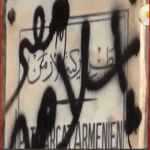August 17, 2013 | 12:20
YEREVAN. – Defense Minister Seyran Ohanyan said Armenia’s approaches towards settlement of Karabakh conflict are in accordance with the international norms:  right of nations to self-determination, non-use of force and territorial integrity
right of nations to self-determination, non-use of force and territorial integrity
Minister Ohanyan spoke about Armenia’s stance during the meeting with the participants of Baze 2013 annual All-Armenian youth camp.
He noted that territorial integrity of Azerbaijan bears no relation to Nagorno-Karabakh, adding that the territory of Nagorno-Karabakh is much larger than the current territory of the Nagorno-Karabakh Republic.
As regards Azerbaijan’s military buildup, Armenian side has enough forces and resources for defense and counterattack.








